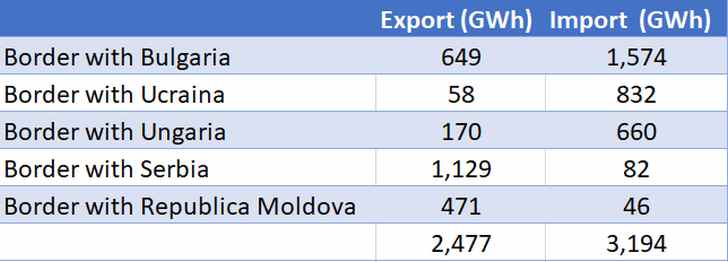Dumitru Chisăliță, President of the Intelligent Energy Association
Romanian energy system entered into crisis in 2017-2018. Statistically, it was the year in which gas imports started to increase again (after 27 years of decrease), it was the year in which domestic electricity production was showing the first signs that it could no longer cope with consumption, the year in which disconnections from thermal energy reached the highest levels, in which many CETs were closed, the year in which the exploitation of gas from The Black Sea was blocked, the year in which investments in energy were blocked etc. The crisis intensified and went through various phases, more and more each year, as a result of the fact that all the measures taken did not target the causes, but the effects of the crisis and, they were not directed to the future, but to the present. The evolution of the last months has made things worse and moreover, the measures taken, again instead of treating the causes, treated the effects.
The current energy crisis is due to the lack of production capacities to cover energy needs. This must be fundamentally understood.
Shortages, whatever they may be, generate specula. Specula means price increases. Specula cannot be defeated with laws, but with the elimination of shortages. Laws, and regulations may bring a short-term reduction in specula, but in the absence of goods, new methods will be found to promote specula and this will escalate even more in the future.
In fact, the “lack of energy” (the huge deficit of primary energy at the level of Europe) is also the element that determines the actions of the Russians and how the stocks are traded in Europe.
The experience of the last 70 years has demonstrated the failure of actions “against nature”.
The new Ordinance regarding the capping and compensation of the energy prices is against a part of consumers, against suppliers, against the economy, against Romania’s future.
This is probably due to the fact that behind the Ordinance, in our opinion, are the same people who in the last 20 years were the ones who privatized PETROM, Distrigaz Sud, Distrigaz Nord, Electrica, blocked the Tarnița Project, blocked the exploration of unconventional gases and the exploitation of gases from the Black Sea, have determined the closure of electricity production capacities, have favored dependence on Russian gas and the import of electricity.
The most unpleasant thing about the New Ordinance is that it talks about lowering the price of energy for consumers, when in fact it will increase for many consumers, exactly now before winter. Practically all consumers who are not SMEs or institutions, but also part of the household consumers, will be obliged to pay to start from September 1, 2022, the market price (i.e. to pay double compared to the price paid until 31 August 2022).
The sad thing is that it suggests itself veiledly and falsely that it was at the demand of the EU (which proposed a voluntary reduction of natural gas consumption by 15%) that was the basis for lowering the electricity consumption threshold up to which the ceiling is granted. The EU request was an optional reduction of annual gas consumption by 15% as an average of the last 5 years. Statistically, Romania will have a 15% reduction in consumption this year, compared to the average of the last 5 years, thus theoretically we would fulfill the EU requirement.
Several hundred thousand household consumers who paid until August 3, 2022, a price of 1 leu/kWh will pay from September 1, 2022, at least double for the same kWh. It is certain that electricity suppliers have already increased their offer price for electricity, as we anticipated, by transferring the costs generated by the New Ordinance to consumers. If on August 31, 2022, the lowest offer from the ANRE comparator, for electricity sold to household consumers was 1.58 lei/kWh, on September 3, 2022, the lowest offer was 1.79 lei/kWh (an increase of 12.5%), and the supplier offering 1.58 lei/kWh in August 31, 2022, today offers 2.93 lei/kWh (an increase of 85%).
Industrial electricity consumers (except SMEs) do not currently benefit from any support. These consumers are the ones who produce added value and essentially contribute to the Romanian economy. They discover how overnight their costs are changed, even though calculated these costs according to Romanian laws, during the period covered by these laws. To pass a law overnight, fundamentally changing the costs for some, the contracts for the goods produced etc. is defiant to them and creates premises for reducing or even stopping industrial activity. Anyway, those who will resist this situation will also transfer the additional energy costs to the population, the beneficiary of their products.
Transport and distribution operators in the gas and electricity sectors face substantial cost increases, especially for energy and gas, which will be recovered in stages over a period of 5 years, according to the Ordinance, starting in the fall of 2023 (probably the term will be extended until the year 2025, for electoral reasons). This situation brings financial blockages at the level of network operators, too, in addition to those expected at suppliers and consumers.
Imposing a settlement limit for electricity at a maximum of 1,300 lei/MWh in the conditions that Romania imported 20% of its consumption on a summer day, and the current prices of important electricity are 3,000 lei/MWh, will determine the possibility so that electricity is no longer imported into Romania because the suppliers risk not receiving their money (which anyway comes 5-6 months late in summer conditions). In the absence of electricity imports, Romania cannot continuously ensure the supply of electricity to all consumers.
Overtaxing supplier profits had to be done, but in a smart way (as proposed by AEI) that would lower prices for electricity and gas, and not with the sole purpose of collecting money for the state budget. The solidarity tax (an over taxation of suppliers in disguise), which adds to the already existing taxes on profit, on dividends, will cause the withdrawal of some suppliers from the Romanian market and restrict the activity exclusively to the few actions that remain profitable (and not covering with priority the supply of energy to consumers).
The indirect prohibition of electricity exports, by the state taking over the entire profit, is a measure that (beyond the violation of the signed treaties) could have worked, if Romania had had a production surplus (if we had had an overproduction of electricity, we didn’t have these high energy prices!). But Romania is a net importer of electricity, there are more periods of the day when it is exported and other periods in which it is imported. Under these conditions, a trader would find itself in a situation where he would lose on export, a fact that may determine him to stop carrying out the import operation, too.
In the 1st semester of 2022, Romania was a net importer with 0.718 TWh compared to the same period of 2015 when we were a net exporter with a quantity of 3.060 TWh.
What to expect from the neighboring countries, with which Romania is connected, about these masked bans on energy exports? Why wouldn’t they ban the export of energy to Romania, too? Especially since Romania is the one that needs electricity imports more in the perspective of winter?

Physical exchanges of electricity in the National Energy System (SEN) in Semester 1 – 2022 (Source: Transelectrica)
Power and gas suppliers have accumulated huge debts, because the state institutions did not comply with the legislation in force and there is a risk of a market lockout, as a result of the blocking of financial flows due to banks’ refusal to provide them with loans for operational needs. An extremely serious problem, which should have been dealt with as a priority in this ordinance, because it is one of the few real operational emergencies of the energy market, was how will the State pay the arrears to the supplier and how such situations will be prevented. This functionality issue, corroborated with the losses that some supply companies will have, with the obligation for some suppliers to sell at a loss, with the lack of energy quantities that we will face in winter, may cause the closure of some supply companies, the withdrawal of some companies from Romania and throwing the state into the situation of nationalizing such companies in the dead of winter. If it happens, it will generate a collapse in the energy system. Moreover, this nationalization action requires funds, which will also have to be taken from consumers.
